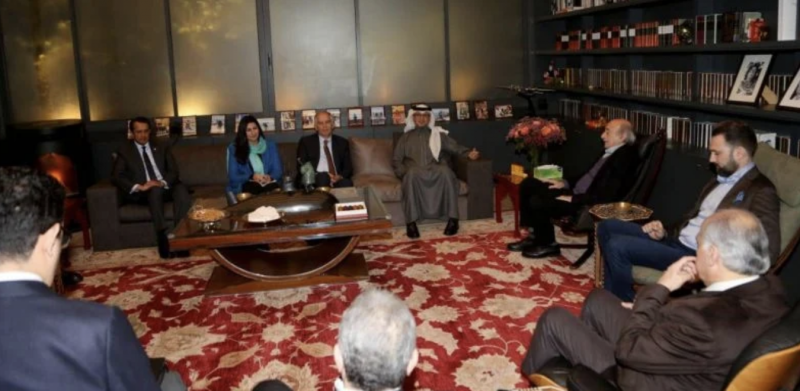
Druze leader Walid Joumblatt and his son, Taymour, talking with the ambassadors of the member countries of the quintet involved in the Lebanese dossier, at Clemenceau, Mar. 19, 2024. (Credit: PSP)
Despite his decision to step down from the presidency of the Progressive Socialist Party (PSP), Druze leader Walid Joumblatt remains a prominent figure in the local political landscape.
This makes significant his recent meeting held on Tuesday evening at his residence in Clemenceau with ambassadors in Beirut from the quintet involved in the Lebanese issue (United States, France, Saudi Arabia, Egypt, and Qatar). These nations are actively engaged in efforts to break the deadlock surrounding the presidential election.
The gathering was attended by Joumblatt’s son Taymour Jumblatt, the current leader of the PSP, alongside Hadi Aboul Hosn and Wael Bou Faour, both MPs aligned with Joumblatt’s political stance.
During the meeting, Joumblatt unequivocally conveyed to his counterparts that “neither Hezbollah nor anyone else can impose a [presidential] candidate on us.” These statements may be perceived as a slight deviation from his stance articulated last January.
“I have no problem with the election of [Marada leader] Sleiman Frangieh [backed by Hezbollah and its Shiite ally, the Amal movement], or anyone else,” Joumblatt said in an interview with the Hezbollah-aligned daily Al-Akhbar.
Is he having second thoughts? Joumblatt answered L’Orient-Le Jour’s questions on Wednesday.
How would you sum up your meeting with the quintet’s ambassadors?
I attended it with Taymour. The ambassadors came to listen [rather than talk]. I told them that we are in favor of compromise, especially as neither Hezbollah nor anyone else can impose a [presidential] candidate on us. No party can impose a candidate on the others.
But in January you said that you had no problem with the election of the Hezbollah-endorsed candidate.
I made it clear that I had no problem with the election of Sleiman Frangieh or anyone else.
Are we to deduce from your call for a compromise that you are in favor of the dialogue called for by Parliament Speaker Nabih Berri, knowing that his initiative did not sit well with the opposition camp?
Everyone has their own style. But I am in favor of compromise. In fact, I’ve been advocating [for] it for more than a year and a half now. And that’s why I had talks with Hezbollah [Hussein Khalil, Hezbollah leader Hassan Nasrallah’s right-hand man, as well as Wafiq Safa, a senior party member, in August 2022].
What is the way out of the persistent deadlock?
I do not have a clear answer because as things stand now, the major stakeholders are not ready yet to compromise.
The Christian parties managed to converge on the name of Jihad Azour in the face of Frangieh, except that the election did not take place according to the rules of democracy.
That is in the past. We are now in a new phase.
Given all this, what can we expect from the Group of Five?
Their presence and their actions are, in themselves, a good thing, since they show that there is still an international interest in Lebanon. But the Lebanese still need to facilitate their mission in this direction.
On another note, do you think that Hezbollah is aware of the scale of the danger facing Lebanon in the event of war with Israel?
My main concern at the moment is that the conflict should not escalate. This is especially true since American envoy Amos Hochstein made it clear that any truce in Gaza might not have any automatic repercussions in Lebanon. As for Hezbollah, I can’t speak for it. But it certainly has its contacts and is aware of the danger. But the party seems to have entrusted Berri with the task of negotiating a solution with Hochstein.
This article was originally published in L'Orient-Le Jour. Translated by Sahar Ghoussoub.